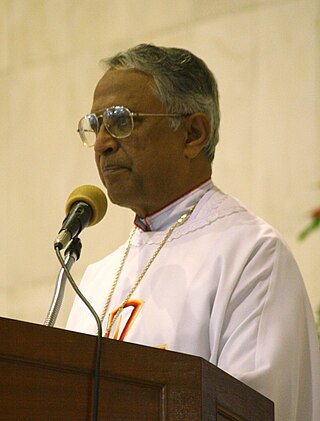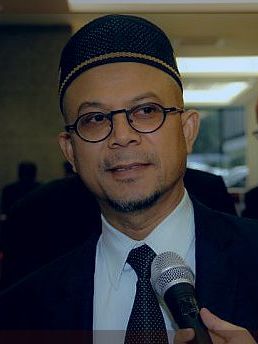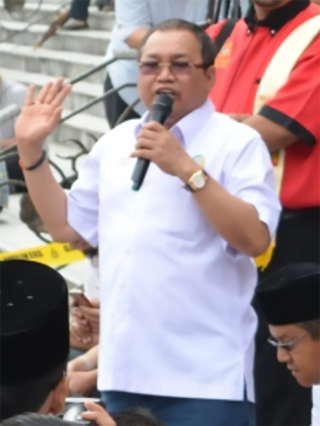
Allah is the common Arabic word for God. In the English language, the word generally refers to God in Islam. The word is thought to be derived by contraction from al-ilāh, which means "the god", and is linguistically related to the Aramaic words Elah and Syriac ܐܲܠܵܗܵܐ (ʼAlāhā) and the Hebrew word El (Elohim) for God.
While freedom of religion is de jure symbolically enshrined in the Malaysian Constitution, it de facto faces many prohibitions and restrictions. A Malay in Malaysia must strictly be a Muslim, and they cannot convert to another religion. Islamic religious practices are determined by official Sharia law, and Muslims can be fined by the state for not fasting or refusing to pray. The country does not consider itself a secular state and that Islam is the state religion of the country, and individuals with no religious affiliation are viewed with hostility.

Islam in Malaysia is represented by the Shafi‘i school of Sunni jurisprudence. Islam was introduced to Malaysia by traders arriving from Persia, Arabia, China and the Indian subcontinent. It became firmly established in the 15th century. In the Constitution of Malaysia, Islam is granted the status of "religion of the Federation" to symbolize its importance to Malaysian society, while defining Malaysia constitutionally as a secular state. Therefore, other religions can be practiced legally, though freedom of religion is still limited in Malaysia.

Christianity is a minority religion in Malaysia. In the 2020 census, 9.1% of the Malaysian population identified themselves as Christians. About two-thirds of Malaysia's Christian population lives in East Malaysia, in the states of Sabah and Sarawak. Adherents of Christianity represent a majority (50.1%) of the population in Sarawak, which is Malaysia's largest state by land area. Christianity is one of four major religions including Islam, Hinduism, and Buddhism that has a freedom protected by the law in Malaysia based of diversity law especially in East Malaysia.
The protection of basic human rights is enshrined in Constitution of Malaysia. These include liberty of the person and prohibition of slavery and forced labour. At the national level, legislative measures that exist to prevent human rights violations and abuses can be found in acts and laws on issues that either have a human rights component or relate to certain groups of society whose rights may be at risk of being violated. Human rights groups are generally critical of the Malaysian government and the Royal Malaysia Police. Preventive detention laws such as the Internal Security Act and the Emergency Ordinance 1969 allow for detention without trial or charge and as such are a source of concern for human rights organizations like Suara Rakyat Malaysia.
Censorship is a long term issue in Malaysia which has become more apparent as it attempts to adapt to a modern knowledge-based economy. Despite having in its Federal Constitution that subject to certain conditions, "every citizen has the right to freedom of speech and expression", Malaysia has consistently sat low on global indexes related to press and media freedom.

Mohd Faizal Musa, also known under the pen name Faisal Tehrani, is a Malaysian author and playwright. Due to the frequent writing and ideas he was known as a controversial person. He is the author of many books and literary works of various lengths, including stage plays. National Laureate Anwar Ridwan praises of Faisal's writing "conscious of high literature and full of vision."

Lesbian, gay, bisexual, and transgender (LGBT) people in Malaysia face severe challenges not experienced by non-LGBT residents. Sodomy is a crime in the country, with laws enforced arbitrarily. Extrajudicial murders of LGBT people have also occurred in the country. There are no Malaysian laws that protect the LGBT community against discrimination and hate crimes. As such, the LGBT demographic in the country are hard to ascertain due to widespread fears from being ostracised and prosecuted, including violence.

Islam is the state religion of Malaysia, as per Article 3 of the Constitution. Meanwhile, other religions can be practised by non-Malay citizens of the country. In addition, per Article 160, one must be Muslim to be considered Malay. As of the 2020 Population and Housing Census, 63.5 percent of the population practices Islam; 18.7 percent Buddhism; 9.1 percent Christianity; 6.1 percent Hinduism; and 2.7 percent other religion or gave no information. The remainder is accounted for by other faiths, including Animism, Folk religion, Sikhism, Baháʼí Faith and other belief systems. The states of Sarawak and Penang and the federal territory of Kuala Lumpur have non-Muslim majorities. Numbers of self-described atheists in Malaysia are few as renouncing Islam is prohibited for Muslims in Malaysia. As such, the actual number of atheists or converts in the country is hard to ascertain out of fear from being ostracised or prosecution. The state has come under criticism from human rights organisations for the government's discrimination against atheists, with some cabinet members saying that "the freedom of religion is not the freedom from religion".

Archbishop Tan Sri Datuk Murphy Nicholas Xavier Pakiam, P.S.M., P.J.N. was the third metropolitan archbishop of the Roman Catholic Archdiocese of Kuala Lumpur, Malaysia, from 2003 to 2013. He is styled His Grace The Most Reverend Archbishop Tan Sri Datuk.
The Christian Federation of Malaysia is an ecumenical umbrella body in Malaysia that comprises the Council of Churches of Malaysia, National Evangelical Christian Fellowship (Evangelicals) and the Catholic Bishops' Conference of Malaysia. Formed in 1985, the CFM brought together the major expressions of Christianity in Malaysia in a broad-based ecumenical body and a unified voice in dealing with the government as well as other religious and secular bodies in the country.
Herald Malaysia is a multilingual Malaysian Catholic weekly newspaper. It publishes in English with additional language sections inside in Chinese, Tamil and Malaysian languages.
Tan Keng Liang, is a politician in Malaysia but has not been elected in either State or Parliament Seats, who is currently the Parti Gerakan Rakyat Malaysia (Gerakan) Youth Chief. Gerakan is a component of Malaysia's previous ruling coalition, Barisan Nasional (BN). He won the election for the post of Gerakan Youth head for the 2013/2016 session at the Gerakan Youth and Wanita wings' conference defeating Oh Tong Keong.

Khalid bin Abdul Samad is a Malaysian politician who served as the Minister of Federal Territories in the Pakatan Harapan (PH) administration under former Prime Minister Mahathir Mohamad from July 2018 to the collapse of the PH administration in February 2020 and the Member of Parliament (MP) for Shah Alam from March 2008 to November 2022. He is a member, Communications Director and State Chairman of Kelantan of the National Trust Party (AMANAH), a component party of the PH coalition and was a member of the Malaysian Islamic Party (PAS), a former component party of the former Pakatan Rakyat (PR) and Barisan Alternatif (BA) coalitions. He is also the younger brother of Shahrir Abdul Samad, former Minister and MP of the United Malays National Organisation (UMNO), a component party of the Barisan Nasional (BN) coalition. Before PH and BN formed the federal coalition government in November 2022, they were opposing politically as both of them were in opposing political sides.
Malaysia curbs blasphemy and any insult to religion or to the religious by rigorous control of what people in that country can say or do. Government-funded schools teach young Muslims the principles of Sunni Islam, and instruct young non-Muslims on morals. The government informs the citizenry on proper behavior and attitudes, and ensures that Muslim civil servants take courses in Sunni Islam. The government ensures that the broadcasting and publishing media do not create disharmony or disobedience. If someone blasphemes or otherwise engages in deviant behavior, Malaysia punishes such transgression with Sharia or through legislation such as the Penal Code.

Datuk Seri Zulkifli Noordin is a Malaysian politician and a former Member of the Parliament of Malaysia for the Kulim–Bandar Baharu constituency in Kedah. He held the seat as an Independent, although having been elected on the ticket and as a member of the People's Justice Party (PKR) but was sacked in 2010. Zulkifli was also the deputy president of right-wing Malay organisation, Perkasa.

Dato' Dr. Ibrahim bin Ali is a Malaysian politician. He is informally known as Tok Him. He served as the Member of Parliament (MP) for Pasir Mas from August 1986 to April 1995 and again from March 2008 to May 2013. He is a member of the Parti Bumiputera Perkasa Malaysia (PUTRA), a component party of the Gerakan Tanah Air (GTA) opposition coalition. He has served as the 1st and founding President of PUTRA since May 2019. He is also founding President of the Malay dominance organisation Pertubuhan Pribumi Perkasa (PERKASA).
Attacks against places of worship in Malaysia were carried out in January 2010 in response to Malaysia v. The Herald, a controversial court decision holding government regulations prohibiting non-Muslim publications from using the word 'Allah' to be unconstitutional. The government and many religious leaders condemned the attacks and called for calm and unity among Malaysians. The police are conducting investigations into the attacks and several arrests and prosecutions have been made.
The Anwar Ibrahim sodomy trials are a source of considerable political controversy in Malaysia. The first trial was held in 1998, and resulted in former Deputy Prime Minister Anwar Ibrahim being convicted, and given a nine-year prison sentence. This verdict was overturned in 2004, resulting in Anwar's release from prison.

Pertubuhan Pribumi Perkasa, is a Malay supremacist non-governmental organisation (NGO) that was formed by Ibrahim Ali in the aftermath of the 2008 general election (GE12). This conservative, extreme-right, ethnic Malay organisation is led by its president Ibrahim Ali to influence the unity of Malaysian by refusing to accept any decoration of other ethnic group except Malay decoration. The group is reported to have a membership of 700,000.










